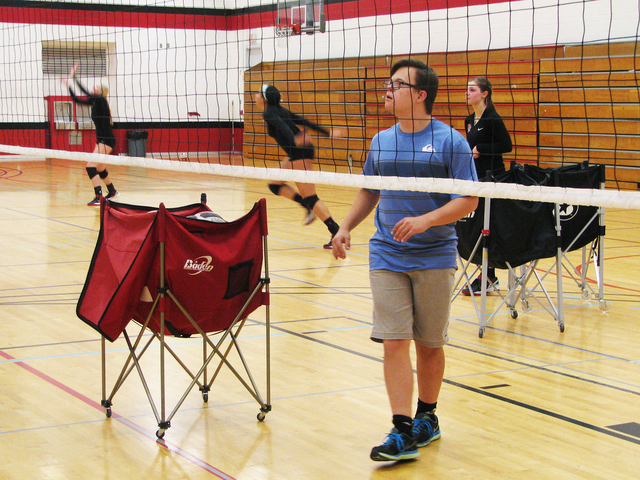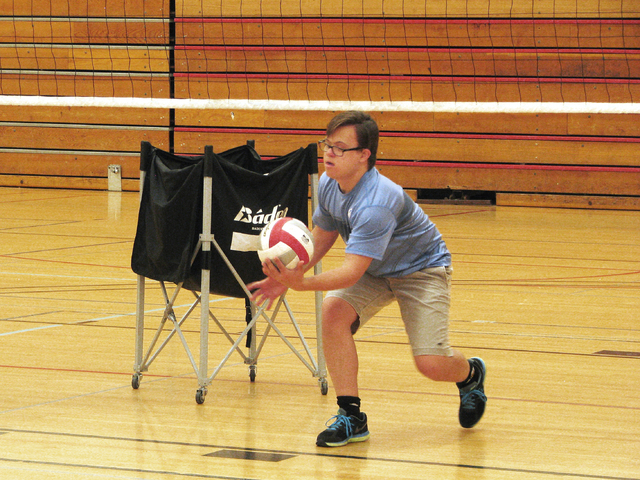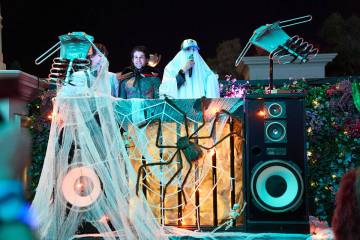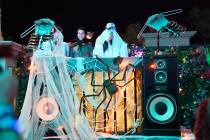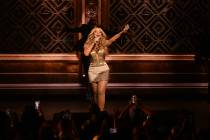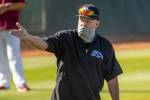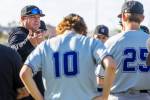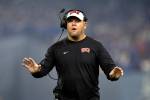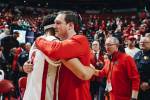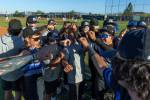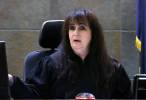Special education program helps students pursue their passions
Clayton Rhodes attends classes and works with the UNLV women’s volleyball team as part of the work study program and is a big fan and booster of the school’s athletic programs.
Rhodes is also the first and only student in a UNLV program called F.O.C.U.S., which stands for Forming Occupational and Community Understanding for Success. He has Down syndrome, but he doesn’t let that hold him back.
The young athlete was on the football and basketball teams at Faith Lutheran High School, 2015 S. Hualapai Way. He dreamed of attending UNLV, but he didn’t think college was in his future until Joshua Baker, an assistant professor in special education at UNLV, launched the pilot program.
“There are about 200 of these programs across the country, but when I moved here a few years ago, there wasn’t one in Nevada,” Baker said. “UNR started their program last year with one student. This year, they added two more. Clayton started this semester, and if everything goes like we’re hoping, the program will take off in a big way.”
The post-secondary education program for students with intellectual disabilities is centered around academics, employment and independent living. Many of the similar programs established in other parts of the country have the students housed in dorms, and Baker said that’s what the program hopes to do here eventually.
“The program is 100 percent inclusive,” Baker said. “He’s not going to special classes by himself. He’s taking the regular classes other students do. We have a small team to establish the program. It’s just me, a few interns and a graduate assistant. We assist with tutoring, and we assist with activities like movie nights or if a student in the program wants to get involved with a sorority or a fraternity, but it’s all in the regular school facilities with his fellow UNLV students.”
The plan for Rhodes and others who take part in the program is to earn a two-year Certificate of Occupational and Career Life Studies.
“It’s a certificate they work towards,” Baker said. “We won’t just hand them out. Hopefully, when it’s all done, it will lead to paid employment in a job they like.”
Baker said the most important aspect of the program is helping to get students with intellectual disabilities into jobs they find interesting.
“The stereotype is that these individuals have to work at a thrift store sorting coat hangers or shred paper or clean toilets,” Baker said. “If they don’t want to do that work, they shouldn’t have to. If there’s work they have a passion for, we want them there.”
Matt Love, a doctoral graduate assistant in the UNLV Department of Educational and Clinical Studies, is part of Baker’s team. He feels the program can lead students such as Rhodes to a better life.
“We want our students to have something that is more of a career than a job,” Love said. “If they’re doing that, they’ll have a higher quality of life and more enjoyment in the field they’re working in.”
Rhodes’ interest has always been sports, and Baker and his team hope to get him into a related job, perhaps on the staff at a gym.
“Right now, the volleyball team has him setting up the net and shagging balls during practice,” Baker said. “That may lead to bigger responsibilities, like getting the equipment ready for games.”
A few weeks into the program and Rhodes was at work chasing after scores of volleyballs struck by a couple dozen student-athletes. The task appeared Sisyphean, but he never faltered or complained, although he had to do some dodging.
The program is starting small because it has a lot of ground to break in the state.
“When you’re looking at nontraditional ways to get kids enrolled in college, there are a lot of bureaucratic systems you have to go through and systems to set up,” Love said.
Several of the similar programs were set in motion by the the 2008 Higher Education Opportunity Act, which revised previous acts and clarified special education students’ access to Pell Grants and work study programs. Funding was awarded by competition, and Baker is working to get Nevada into the running when federal money is granted for programs this year.
“We may partner with UNR,” Baker said. “If it all works out, and we get the grant, we can expand the programs at the universities and branch out across Nevada and bring it to the College of Southern Nevada, Nevada State College and the community colleges around the state.”
For now, the team is concentrating on getting Rhodes through his first semester and working with him toward his certificate. Expansion to more students will likely start next semester.
For more information, visit tinyurl.com/unlvfocus.
To reach East Valley View reporter F. Andrew Taylor, email ataylor@viewnews.com or call 702-380-4532.



